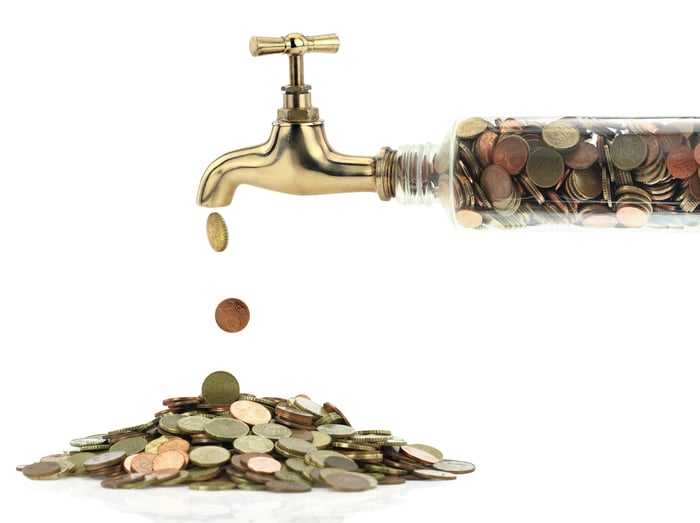Boring is good when you're looking for stocks to supplement your Social Security income. You don't want high-risk, high-reward growth stocks. You want companies with long and profitable histories that have increased their dividends even in tough times. If you're looking for dividend stocks to generate income in retirement, Procter & Gamble (NYSE:PG), Realty Income (NYSE:O), and Costco Wholesale (NASDAQ:COST) are fabulous options.
1. Procter & Gamble
Procter & Gamble may seem like the kind of stodgy company your grandparents would have invested in. The consumer staples behemoth isn't exactly known as cutting-edge, though you probably have its products somewhere in your home. Its 65 brands include Pampers diapers, Tide laundry products, Charmin toilet paper, Bounty paper towels, Gillette razors and shaving gel, and Herbal Essences hair care. Even in recessions, people need the products that Procter & Gamble makes, and they don't change their consumption habits much in good times or bad.

Image source: Getty Images.
The company may not have a ton of room to grow, but there are plenty of reasons to bet on Procter & Gamble's long-term success. In 2014, it began streamlining and ultimately axed about 100 of its less profitable brands. In its 2020 fiscal year, its operating cash flow rose 14% to $17.4 billion. And while the company has been somewhat slow to adopt e-commerce, in its fiscal quarter that ended in September, it grew online sales by 50%.
There's no such thing as a guaranteed dividend, but Procter & Gamble's is about as close as you can get. It's paid out dividends since 1890 and has achieved Dividend King status, with 64 years of consecutive increases under its belt. With annual dividends of about $3.16 per share, it has a yield of 2.28%. Procter & Gamble was a solid bet for your grandparents' retirement portfolio, and it will probably still be a great stock for your grandchildren to have in their portfolios when they retire.
2. Realty Income
Real estate investment trusts, or REITs, tend to produce big dividends because they're required to pay out 90% of their taxable income. For investors looking to supplement their Social Security, you can't get much better than Realty Income. Its yield is 4.46%, and it pays dividends monthly. (It's even adopted the name "The Monthly Dividend Company.") It's declared 605 consecutive monthly dividends and has increased its dividend 108 times since going public in 1994.
Realty Income specializes in single-tenant retail properties with triple-net leases. Though these tend to be low-risk because the tenant pays for real estate taxes, insurance, and maintenance costs, that doesn't provide as much comfort during the COVID-19 era when so many businesses are at risk of folding. Realty Income's shares are down about 15% year to date, but there are plenty of reasons to keep it in your portfolio. Its tenants tend to be essential businesses. Convenience stores, drug stores, grocery stores, and dollar stores are its four largest categories. In the third quarter, it collected about 93% of its contracted rent, with theaters and gyms accounting for 80% of unpaid rent.
Because its tenants don't tend to have the type of businesses that can easily migrate online, it's worth putting pandemic worries aside and scooping up Realty Income at a discount if you're looking for an income-generating investment.
3. Costco
Costco's annual dividends of $2.80 per share gives it a yield of 0.72%, which may not look impressive. Keep in mind though that just as a high yield can make a stock look deceptively appealing when its price has dropped, a dividend can look puny when share prices have skyrocketed. So before you dismiss its dividend as lackluster, remember that its share prices have soared by about one-third year to date.
The warehouse club has an established track record of raising its dividend, though. It has yet to achieve the 25 years of consecutive increases needed for Dividend Aristocrat status, but it has increased dividends for 16 years in a row. Plus, Costco is about to reward shareholders with a $10 per share special cash dividend -- its fourth special dividend since 2012.
Costco has benefited from people stocking up on staples during the pandemic, with October sales up nearly 16% compared to October 2019. There are plenty of reasons to buy Costco stock and hold it for the long haul -- but the most important of these is that customers really like Costco. It makes most of its money from membership fees, rather than retail sales, and about 91% of customers renew their membership each year.As long as people are willing to pay Costco to shop there, Costco will be a good stock to hold.
Its regular dividends may be a bit paltry for supplementing your Social Security. But the somewhat predictable windfall special dividends easily make up for that.





